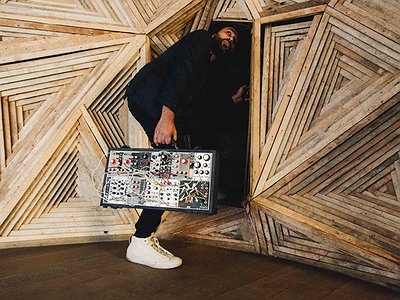Part 2
Could you describe your creative process on the basis of a piece or album that's particularly dear to you, please? Where did the ideas come from, how were they transformed in your mind, what did you start with and how do you refine these beginnings into the finished work of art?
One work that I’m particularly proud of is a choral piece I wrote some years back called Fjoloy. It was originally commissioned as a score for a film installation about Norway. In the very beginning, we were going to work with the radio choir of Norway, but all of the funding fell through at the last minute and we essentially had to create 45 minutes of choral music with no budget. I ended up finding an extra-curricular student ensemble in NY but the music was too hard to learn in the time we had, so I scrapped it and feverishly tried to come up with an idea for creating some rather complex music, in a month’s time, that a student choir could learn and absorb in 3, 25-minute rehearsals.
Eventually I came up with this idea of headphone music. I composed everything on an ARP Odyssey synthesizer. Each vocal line from this synthesizer was recorded and cataloged as a collection of mp3s, within the SSAATTBB [choral arrangement for two soprano, alto, tenor and bass voices] configuration and in performance, rather than having a written part, each singer was given a designated mp3 based on their assignment in the choir and the entire ensemble sang along to their ordained synthesized tones with headphones, live. The result was rather incredible and they were able to execute difficult ideas because of the guide pitch. It was also an important experience for me because through this place of efficiency and resourcefulness, I was able to create a new musical language.
There are many descriptions of the ideal state of mind for being creative. What is it like for you? What supports this ideal state of mind and what are distractions? Are there strategies to enter into this state more easily?
For me sometimes the most fearful place is when I actually have to get started, but often times that goes away once I begin. I’ve also had to learn to not push myself too much if I’m having an uncreative day or if I’m not happy with my results. Sometimes you just have to step away from it and not beat yourself up if the ideas aren’t flowing.
How is playing live and writing music in the studio connected? What do you achieve and draw from each experience personally? How do you see the relationship between improvisation and composition in this regard?
I actually find them to be very separate things. When I’m playing it’s more in the moment and I find I’m not having to think as meticulously as when I’m in the studio writing music. Producing/writing music for me can be a very slow process, where I’m throwing a lot of ideas out and starting from scratch, and experimenting until I get to something that feels right to me.
How do you see the relationship between the 'sound' aspects of music and the 'composition' aspects? How do you work with sound and timbre to meet certain production ideas and in which way can certain sounds already take on compositional qualities?
The sound and timbre thing is very important for me and I think it’s kind of an essential component now in a lot of music production. It was something that was taught to me early on when I was learning the drums. The timbre that envelops the note is a whole world unto itself. Working more with electronics has brought other ideas to the table, especially with modular synthesizers. With the modular it’s all about attenuating and modulating the frequencies of different wave shapes, to alter their harmonics and create rich timbres. That’s blowing my mind at the moment.
Our sense of hearing shares intriguing connections to other senses. From your experience, what are some of the most inspiring overlaps between different senses - and what do they tell us about the way our senses work? What happens to sound at its outermost borders?
It’s hard for me to say. I guess my visual sense is the most deeply tied to sound, perhaps from working in film for so long and creating music that’s designed to support a visual medium.
Art can be a purpose in its own right, but it can also directly feed back into everyday life, take on a social and political role and lead to more engagement. Can you describe your approach to art and being an artist?
This is possibly a broad answer, but as a Pakistani American, I’ve been asked quite often if my work addresses my culture, like if it speaks to the South Asian experience in some way. I feel like a lot of artists who are part of minority groups are often asked this question and expected in some ways, to wear their culture on their sleeve, as a way to gain validity from the larger art world. And I find this type of inquiry to be tokenistic. If anything I’m trying to run away from myself when I make art. And my hope is to make art that allows people to run away from themselves, for a minute...
It is remarkable, in a way, that we have arrived in the 21st century with the basic concept of music still intact. Do you have a vision of music, an idea of what music could be beyond its current form?
It would be awesome if over time there could be a greater appreciation of experimental music, if it could reach a larger audience both in performance and through record labels, and what they put out in the world.





